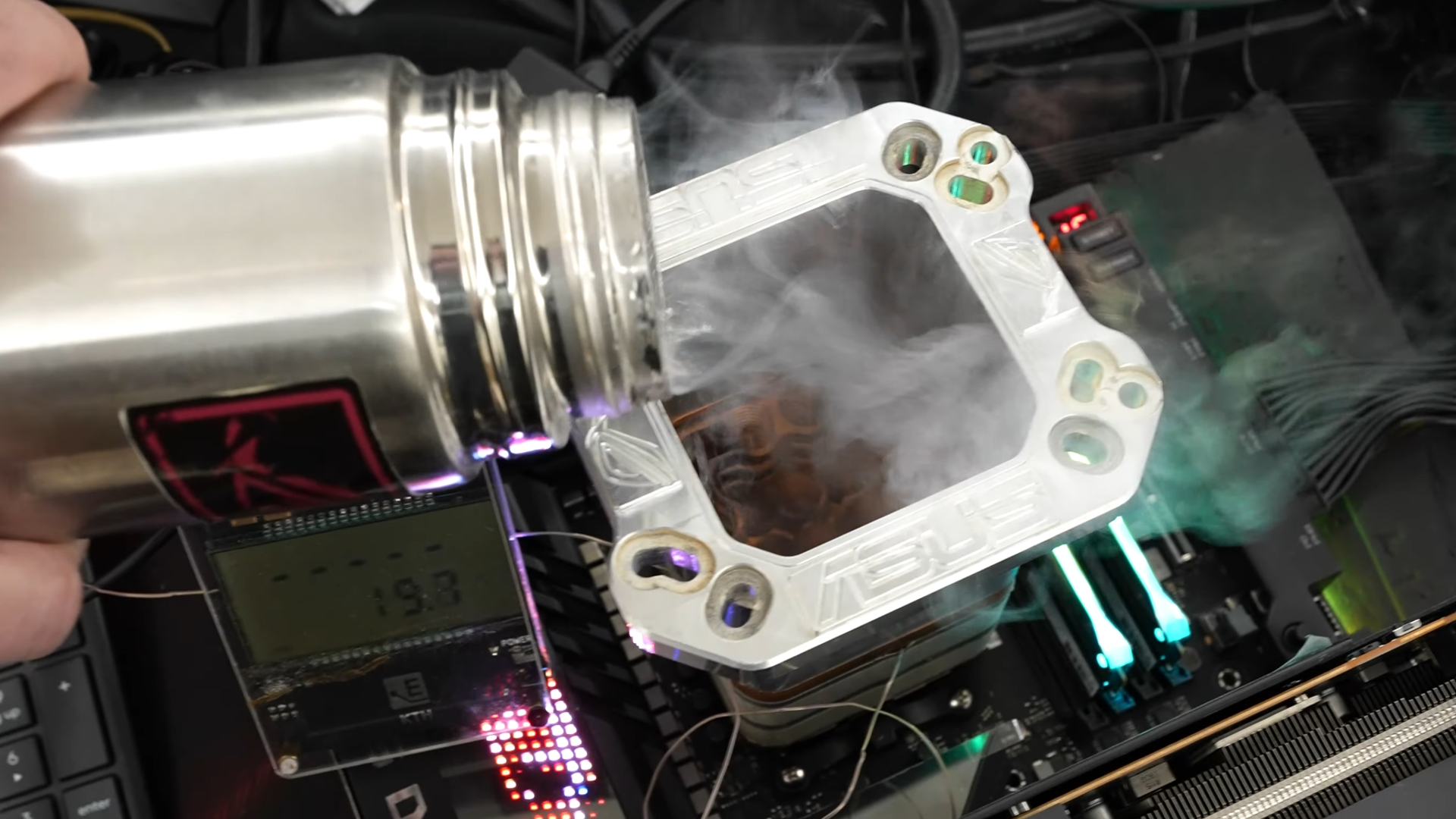Pro overclocker bricks AMD's best gaming chip without really trying
Maybe don't overvolt the Ryzen 9 7950X3D past 1.35V, just in case.

Seems like it might be surprisingly easy to brick one of AMD's best gaming CPUs, even if you're a professional overclocking YouTuber. The world now has one less AMD Ryzen 9 7950X3D after a slight voltage tweak above just 1.35V.
Roman Hartung, aka der8auer, recently took a trip to Taiwan to visit the Asus testing labs. There he decided to put some CPUs to the test but, as it turns out, even when it comes to enthusiast grade CPUs such as the latest X3D chip the old saying stands: Just because you can, doesn't mean you should.
Actually, with AMD's finest gaming chip, it seems you really really shouldn't.
One of the great things about AMD's Ryzen 7000-series CPUs, is that it's been made super easy to overclock in Windows using PBO 2 and Curve Optimizer. There still remains the option to overclock your chip in the BIOS, however, where you may be presented with the option to push the voltage all the way up to 2.5V. Eep.
So, alongside some other testing, Hartung set about pushing the voltages of a Ryzen 9 7950X3D Asus had lent him. Much to his dismay, all did not go to plan (via HardwareLuxx).
He first tested the waters by babystepping the voltage up to 1.35V. And while it was necessary to run and grab a liquid nitrogen cooler to keep it between 85°C and 90°C, Hartung still decided to push things further.

He saw the danger, and he did it anyway.
Keep up to date with the most important stories and the best deals, as picked by the PC Gamer team.
The moment the CPU hit 1.5V, everything went out the window. The motherboard threw up a 00 error code, and despite his best efforts, sadly it looked like nothing could be done to save the CPU.
It was clear the Ryzen 9 7950X3D had been fried even before the CPU came under load. And while Hartung himself admits it could just be bad luck on his part, since not many extreme tests have come out for AMD's new super high-end addition to the Ryzen family, HardwareLuxx has issued a warning to users in case anyone decides to push the voltage just because the option is there.
He has spoken to both AMD and Asus and been told the chips weren't intended to be allowed to run with such a high VCore rating. He also says that "Asus will probably limit the max manual voltage to 1.35V," which will likely be done via BIOS updates.

Best CPU for gaming: The top chips from Intel and AMD
Best gaming motherboard: The right boards
Best graphics card: Your perfect pixel-pusher awaits
Best SSD for gaming: Get into the game ahead of the rest
During his trip, Hartung also had a chance to check out the $6,000 Intel Xeon W9 3495X chip. We've already reported on der8auer showing off the 56-core Intel chip at stock speeds of 4.2GHz at home, but he was confident then he could push it further in Asus' labs.
"I actually thought that 4.4GHz or 4.5GHz should be totally easy, but that was not the case", says Hartung about the Sapphire Rapids CPU (machine translated). That said, he did manage to beat 4.7GHz on all 56 cores despite several crashes in Cinebench R23 owing to issues with the input voltage. That translated to around 114,000 points, and really shows what these enthusiast CPUs are capable of when paired with just an AIO watercooler.
With a liquid nitrogen cooling solution, Hartung was able to push the CPU up to 2.5GHz and achieve a smashing 125,000 points in Cinebench R23—a new record, in fact.
Red team enthusiasts may be disappointed that they're not going to be able to push their CPU voltages up to those kinds of heights, but at least we can rest assured that BIOS are likely to be updated to stop folk going beyond 1.35V. No one wants to find out they've accidentally fried their monster CPU in a flight of overvolting fancy.
Only you can prevent CPU fires.

Screw sports, Katie would rather watch Intel, AMD and Nvidia go at it. Having been obsessed with computers and graphics for three long decades, she took Game Art and Design up to Masters level at uni, and has been rambling about games, tech and science—rather sarcastically—for four years since. She can be found admiring technological advancements, scrambling for scintillating Raspberry Pi projects, preaching cybersecurity awareness, sighing over semiconductors, and gawping at the latest GPU upgrades. Right now she's waiting patiently for her chance to upload her consciousness into the cloud.

